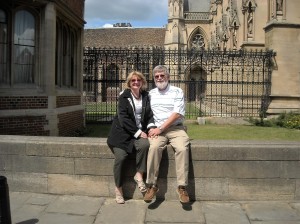
1 Corinthians 15:20-28
When Jesus came, he announced that the kingdom of God, God’s saving reign, had arrived (Mark 1:15). As we saw in our last article on Paradise Regained, the power of this kingdom is connected with the resurrection of the Lord Jesus from the dead. His resurrection changes everything! What we should think on now is that God’s kingdom is presently active (15:25). “For he must reign until he has put all enemies under his feet” (cf. Psalm 110:1).
Christ is presently reigning. His reign began through the events of his resurrection and ascension. Listen to Peter’s confident words on Pentecost (Acts 2:29-36 ESV): “Brothers, I may say to you with confidence about the patriarch David that he both died and was buried, and his tomb is with us to this day. Being therefore a prophet, and knowing that God had sworn with an oath to him that he would set one of his descendants on his throne, he foresaw and spoke about the resurrection of the Christ, that he was not abandoned to Hades, nor did his flesh see corruption. This Jesus God raised up, and of that we all are witnesses. Being therefore exalted at the right hand of God, and having received from the Father the promise of the Holy Spirit, he has poured out this that you yourselves are seeing and hearing. For David did not ascend into the heavens, but he himself says, ‘The Lord said to my Lord, Sit at my right hand, until I make your enemies your footstool.’ Let all the house of Israel therefore know for certain that God has made him both Lord and Christ, this Jesus whom you crucified” (my emphasis).
Christ’s reign involves an increasing spread of his authority (Isaiah 9:6-7; 42:1-9; 49:5-7; Luke 1:31-33; Acts 1:8). People from across the globe will come under his gracious authority (Revelation 5:9-10). Jesus Christ will reign until he puts all his enemies under his feet. The enemies include the operation of sin or rebellion against God, and the ruin of creation operating through sin, but especially the force of death. Having secured eternal redemption, Jesus the Messiah rules to apply what he has purchased. Notice that Christ is actively putting his enemies under his feet. He does this through the Spirit, who takes the truth that is in Jesus and makes a new humanity under his rule (Ephesians 4:20-5:7).
We have seen the “now”, but we also need to pay careful attention to the “next”. God’s kingdom will surely triumph in this world (15:26-28). All the words of Jesus proclaim this confident expectation. If you’re not sure, I challenge you to read the Four Gospels carefully.
When Paradise was lost when man sinned, sin began to reign in death (cf. Romans 5:12-14, 21). Because of human sin, death has been a great enemy, destroying billions of human lives. Our world is one vast cemetery; a grim memorial park to this terrible foe. Through his crucifixion, our Lord dealt with the problem of sin, and in his resurrection, he dealt with the evil of death. When people come to know the Lord by grace through faith, they enter into the victory of Jesus over sin and death. As Paul says in verse 26, “The last enemy, death, is being destroyed.” Christ’s reign continues until God’s purpose in his Son is fulfilled (15:27-28). God’s plan is to show his great glory in the exaltation of Jesus, the Son of God (cf. Philippians 2:9-11). Obviously, God the Father who designed the plan and sent his Son is not subject to him. But the Son’s great desire is to bring everything subject to God, and his reign pursues that purpose. The final destiny is God glorified and his people enjoying God’s glory forever with him. This is the hope (confident expectation) that all believers share in. In the trials and struggles of life, we can look forward boldly and anticipate the time when Christ’s kingdom is fully extended over a new earth, where we will be forever with God.
Grace and peace, David







